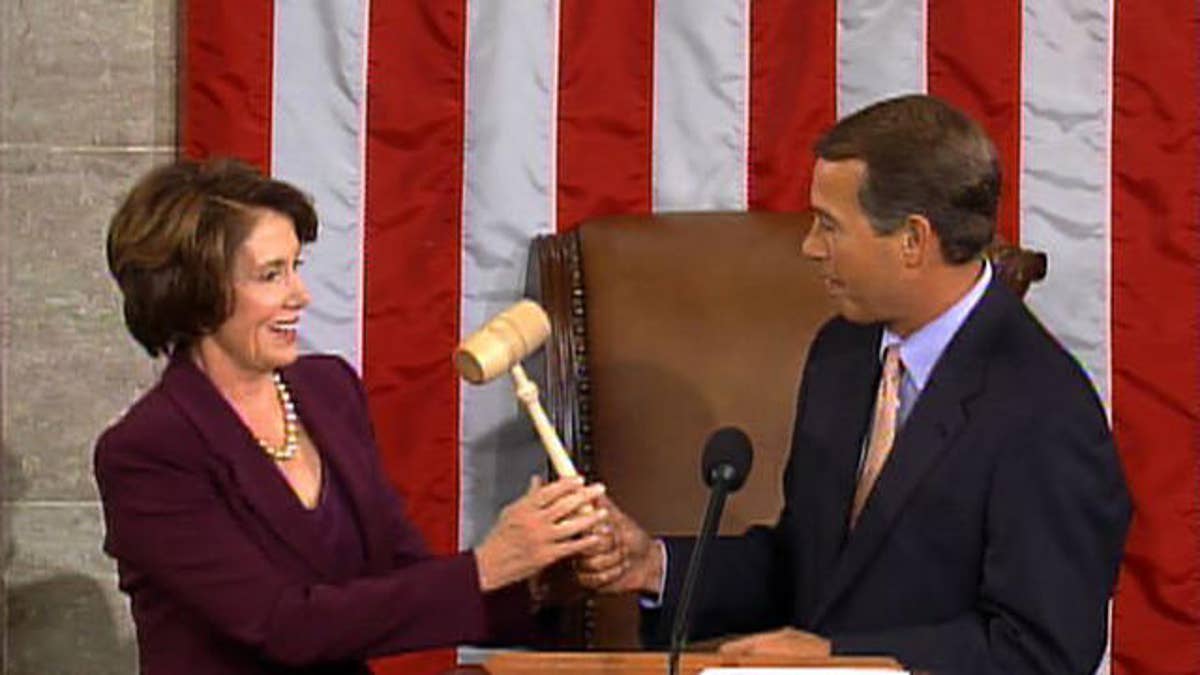
FILE: In this Jan. 4, 2007, photo, Minority Leader John Boehner hands the gavel to newly sworn-in Speaker Nancy Pelosi. A reversal of the two leaders' roles was happening Wednesday. (AP)
WASHINGTON -- No wonder John Boehner keeps getting re-elected. He's got 11 siblings -- 10 of whom have traveled among four busloads of friends and family from Ohio to Washington to attend the ceremonial swearing-in of the new House speaker and 112th Congress on Wednesday.
At noon, the first session of the new Republican-led Congress begins. Up on the rostrum, the speaker's chair will be the one used on opening day by every speaker since Texas legend Sam Rayburn. After Nancy Pelosi hands over the gavel and moves to minority position -- a reversal of the two leaders' roles four years ago -- Boehner will participate in ceremonial oaths in the Capitol room named after Rayburn, who was a Democrat.
And in a gesture of solemnity that just may work for a day, the entire Constitution will be read aloud.
After taking the speaker's gavel, Boehner will commit to restoring the House as an institution focused on listening to the American people and declare an end to congressional maneuvers that have made it easy to avoid tough choices, his aides say.
Expect wet eyes and grand pronouncements as the new speaker delivers a speech in which he acknowledges how temporary his position will be if Republicans don't live up to the will of the American people.
"They have reminded us that everything here is on loan from them. That includes this gavel, which I accept cheerfully and gratefully, knowing I am but its caretaker," Boehner will say, according to an excerpt obtained by Fox News. "What they want is a government that is honest, accountable and responsive to their needs. A government that respects individual liberty, honors our heritage, and bows before the public it serves."
The new GOP majority vows to cut the congressional budget as one of its first actions -- and repeal the health care law, a pledge that's unlikely to be filled. Referring to past legislation as "job killing," Boehner will vow that the GOP's focus will then turn to stopping the government spending binge, though maybe not as much as the American voters are seeking.
The first spending cut vote is set for Thursday, a 5 percent reduction in the amount ticketed for lawmakers' and committees' offices and leadership staff. Aides estimate the savings at $35 million over the next nine months.
Republicans have pledged to vote at least once a week on bills that cut spending. And Cantor challenged President Obama to include significant spending cuts in his State of the Union address on Jan. 25.
But with 2012 campaigns getting underway soon, Obama and congressional Republicans will have to decide whether conflict or compromise works best.
Obama told reporters aboard Air Force One on Tuesday that he expects Republicans initially to "play to their base."
"But I'm pretty confident that they're going to recognize that our job is to govern and make sure that we are delivering jobs for the American people," he added. "My hope is that John Boehner and (Senate GOP leader) Mitch McConnell will realize that there will be plenty of time to campaign for 2012 in 2012."
For her part, soon-to-be-minted House Minority Leader Nancy Pelosi will also deliver remarks. Already on Tuesday, she said it has been the Democratic Party's "mantra" to cut deficits. She added that jobs have been and will be the other big priority for Democrats.
"Democrats will judge what comes before Congress by whether it creates jobs, strengthens our middle class and reduces the deficit -- not burdening future generations with debt. When the new Speaker of the House, John Boehner, and the new Republican majority, come forward with solutions that address these American challenges, you will find in us a willing partner," she will say, according to an excerpt released in advance.
Already, the incoming GOP majority prepared to break its own new rules next week when the House votes, without hearings or a chance to make changes, to cancel Obama's signature health care law -- even though the document is only two pages long.
"It's not like we haven't litigated this for over a year," Boehner said.
Claims have also been made that the repeal would undo another pledge to reduce spending, since the Congressional Budget Office concluded the health care law as passed would cut spending by $143 billion over the next decade. Incoming House Majority Leader Eric Cantor suggested CBO had to cook the books since it's only allowed to use numbers provided to it from the sources requesting the estimate of the bill's cost.
"Everyone knows ... this bill has the potential to bankrupt the federal government and the states," Cantor said.
On the Senate side, the clock moves more slowly. Democrats are pledging to vote on removing senators' filibuster options -- an effort they say will make it easier to pass legislation in a divided chamber by reducing the 60-vote threshold to move forward on bills to a simple majority of 51. That would make bills a lot easier to pass in a Democratic-led chamber whose majority has been reduced form 60 to 53.
The filibuster rules were last changed more than a quarter-century ago, when the number of votes needed to end the stalling tactic was reduced to 60. A two-thirds majority had previously been required.
"The brazenness of this proposed action is that Democrats are proposing to use the very tactics that in the past almost every Democratic leader has denounced, including President Obama and Vice President Biden,"` Sen. Lamar Alexander, R-Tenn., said in a speech Tuesday.
On the other hand, the shrunken Democratic ranks give Republicans leverage to bargain for a reduction in spending on items like a $1.4 billion food safety measure Obama signed Tuesday.
Fox News' Chad Pergram and The Associated Press contributed to this report.




